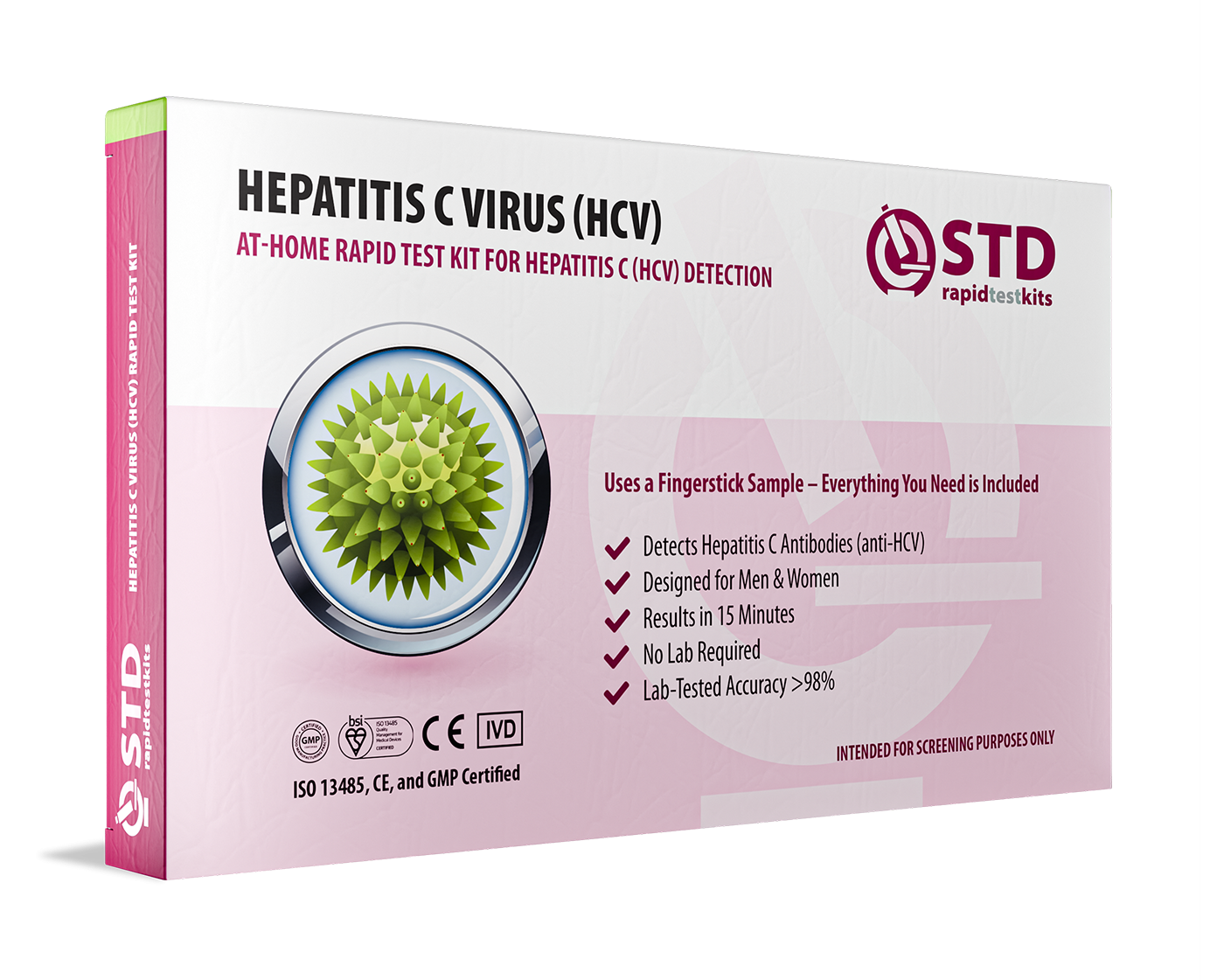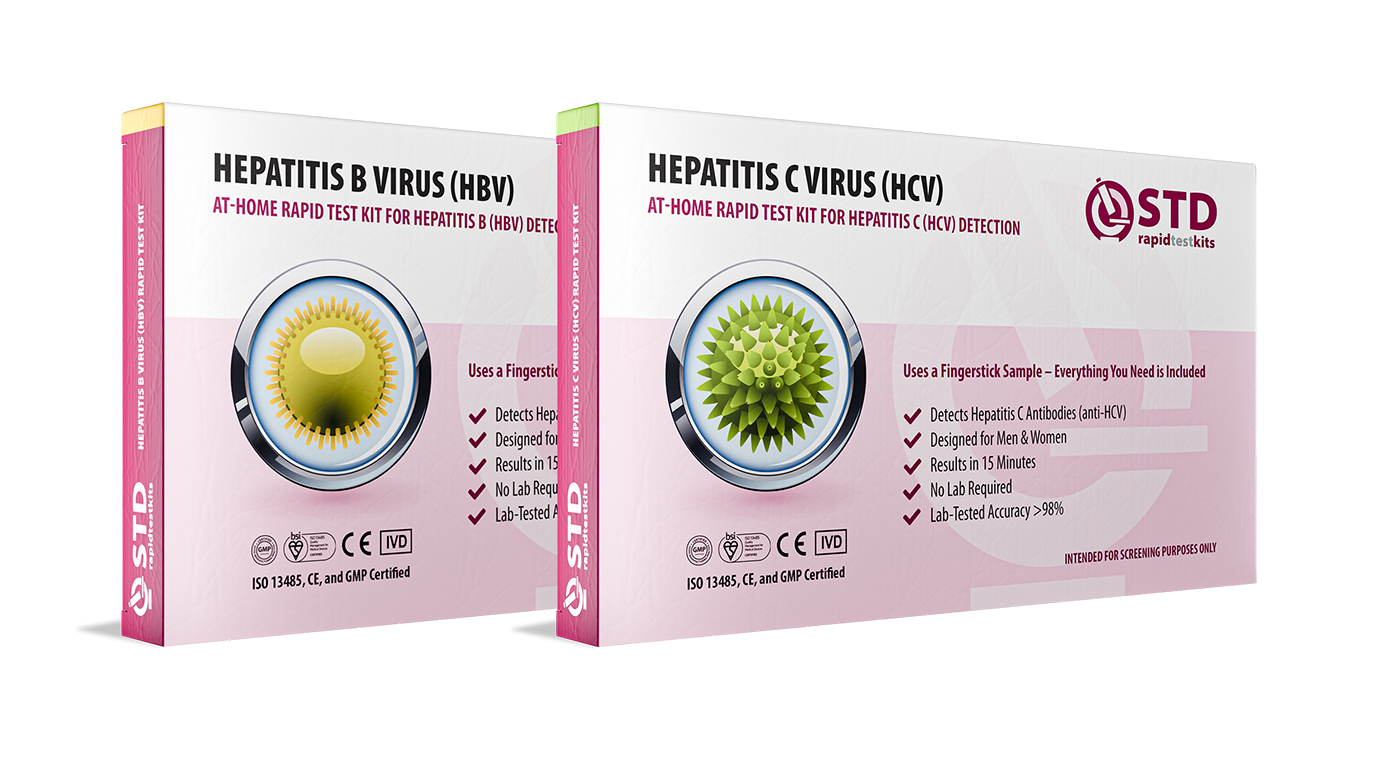Here’s the unsettling truth: You could have Hepatitis C right now and feel totally fine. No fever. No fatigue. No clue.
That’s what makes it so dangerous, and so easy to miss. While some STDs make their presence painfully obvious, Hep C is the opposite: a quiet, calculating virus that can silently damage your liver for years without raising a single red flag.
People are also looking for: What STD causes mouth sores?
The Most Common Symptom? No Symptom at All.
Roughly 70% to 80% of people with Hepatitis C have no symptoms when they’re first infected, according to the CDC. That’s right, no fever, no nausea, no yellowing of the skin. Nothing that would scream, “Hey, something’s wrong.”
That’s why they call it the “silent epidemic.” You don’t realize it’s there until bloodwork flags it, or until your liver starts showing signs of stress years down the line.
By the time symptoms do appear, the virus has usually already made itself at home:
- Fatigue: Often brushed off as stress or poor sleep
- Joint pain: Mistaken for aging or injury
- Dark urine or light stool: Easily overlooked
- Mild jaundice: Rare, but a late-stage clue
You’re not “lucky” if you don’t feel anything. You’re just early in the process. And early is exactly when you want to catch it.
Can You Really Have Hep C for 20 Years and Not Know?
Yes, and it happens all the time. Chronic Hepatitis C can simmer for 10, 20, even 30 years before it shows signs. Some people only find out after a routine blood panel flags abnormal liver enzymes or after they donate blood.
The longer it’s untreated, the greater the risk of serious complications:
- Cirrhosis: Permanent liver scarring
- Liver cancer: Especially in long-term cases
- End-stage liver disease: Requiring transplant
This isn’t fearmongering, it’s biology. Hep C doesn’t rush. It lurks. And by the time your body raises an alarm, the damage is already underway.
Check Your STD Status in Minutes
Test at Home with RemediumHepatitis C Test Kit

 For Men & Women
For Men & Women Results in Minutes
Results in Minutes No Lab Needed
No Lab Needed Private & Discreet
Private & DiscreetOrder Now $33.99 $49.00
How Do You Even Get Hep C Without Noticing?
It’s a fair question. If Hepatitis C is a bloodborne virus, shouldn’t you remember the moment it got in?
Not necessarily. Many people are exposed through:
- Blood transfusions before 1992 (when screening began)
- Shared razors or toothbrushes within households
- Tattoos or piercings done in non-sterile environments
- Medical or dental work in under-resourced settings
- Sexual contact (especially with anal trauma or co-infections)
And some people don’t even know how they got it. This isn’t about irresponsibility, it’s about how well this virus hides and how poorly we’ve been educated about it.
The Emotional Whiplash of a Surprise Diagnosis
Finding out you have Hepatitis C when you feel totally fine can be emotionally jarring. You’re not sick… until you are. And suddenly, you’re running liver function panels and Googling terms like “viral load” and “genotype.”
“I only found out because I tried to donate blood. They called me a week later and said I needed to see a liver specialist. I thought it was a mistake.” Jorge, 41
That kind of emotional whiplash is real. It brings guilt, shame, confusion, and often a desperate attempt to figure out when, how, and from whom. But playing detective won’t change your status. What matters now is treatment.
People are also looking for: What are the signs of throat gonorrhea?
Silent ≠ Harmless: Why You Still Need to Get Tested
Just because Hep C doesn’t show symptoms doesn’t mean it’s harmless. The virus replicates quietly, slowly damaging your liver over time. The only way to catch it early is with a blood test.
The good news? You don’t need a doctor’s permission or a reason to check. With a discreet Hepatitis B + C Test Kit, you can screen yourself from home. No waiting rooms, no judgment, just answers.
And if you test positive, you’re not doomed, you’re eligible for a cure. More on that coming up in Part 2.
How Hepatitis C Gets Diagnosed, Even Without Symptoms
If you’re not feeling sick, how do you even know when to get tested? Here’s the hard truth: you don’t, unless you’re proactive.
The CDC recommends that every adult get tested for Hepatitis C at least once in their lifetime, and more frequently for people who:
- Were born between 1945–1965
- Have injected drugs (even once)
- Received blood before 1992
- Have HIV or liver disease
- Live with someone who has Hep C
The test is a simple blood draw. If antibodies are found, a follow-up RNA test confirms whether the virus is active. And if you test negative? You’re done. No symptoms ≠ no infection, and testing is your first line of defense.
Treatment Is Easier (and More Effective) Than Ever
Back in the early 2000s, Hepatitis C treatment was brutal, months of injections, nasty side effects, and low cure rates. Today? It’s a completely different story.
Thanks to direct-acting antivirals (DAAs), most people can clear Hep C with just 8–12 weeks of oral medication, and minimal side effects.
- Cure rate: Over 95% with current treatments
- Eligibility: Most people qualify, regardless of how long they’ve had the virus
- Follow-up: Blood tests confirm viral clearance after treatment
This is why early detection matters. The earlier you treat, the less liver damage, and the better your long-term health.
Check Your STD Status in Minutes
Test at Home with RemediumHepatitis B & Hepatitis C Test Kit

 For Men & Women
For Men & Women Results in Minutes
Results in Minutes No Lab Needed
No Lab Needed Private & Discreet
Private & DiscreetOrder Now $49.00 $98.00
For all 2 tests
Why Some Doctors Still Miss It (and What to Do About It)
You’d think Hep C would be on every clinician’s radar, but many still overlook it, especially in patients without obvious risk factors. If you’re a woman, over 40, or not using drugs, you might get dismissed as “low risk.”
But here’s the reality:
- 30% of Hep C–positive people have no clear risk factors
- Routine labs won’t catch it unless Hep C testing is specifically ordered
- Women are often misdiagnosed due to subtle symptoms like fatigue or bloating
If your doctor won’t test you, or brushes off your concerns, advocate for yourself. Or take matters into your own hands with a discreet Hepatitis B + C Test Kit. You have every right to know what’s going on inside your body.
The Danger of “I Feel Fine” Thinking
Let’s talk about denial. It’s easy to skip a test when nothing feels wrong. After all, who wants to go hunting for bad news?
“I had no symptoms. None. I only found out because I needed pre-op bloodwork before knee surgery. Turned out I’d had Hep C for over 10 years.” , Malik, 52
This is exactly why Hep C gets missed. No pain, no panic, right? But viruses don’t care about your to-do list or how busy you are. They do their work silently, until it’s too late to ignore.
Getting tested doesn’t make you paranoid. It makes you prepared.
How to Check Yourself, Without a Doctor
If you're not ready to talk to your provider, or you just want control over the process, there’s an easy solution.
The Hepatitis B + C Test Kit gives you lab-grade results from the privacy of your own home. It’s fast, discreet, and delivers clear answers in days, not weeks.
- No insurance required
- Finger prick or dried blood sample
- Test for both Hep B and Hep C in one kit
Whether you’re checking in between partners, doing a health reset, or just curious about your status, this is your no-judgment way to get the clarity you deserve.
FAQs
1. Can you have Hepatitis C and feel totally fine?
Yes. Most people don’t show symptoms for years, which is why routine testing is critical, even if you feel healthy.
2. How long can Hepatitis C go undetected?
Decades. It’s common for people to carry the virus for 10–30 years before diagnosis, often found through unrelated bloodwork.
3. What are the early signs of Hep C, if any?
Fatigue, mild joint pain, dark urine, or nausea are possible, but usually subtle and easily mistaken for something else.
4. How is silent Hep C diagnosed?
Through a two-step blood test: antibody screening followed by an RNA test to confirm active infection.
5. Can I get Hep C from someone who has no symptoms?
Yes. Asymptomatic carriers can still transmit the virus through blood contact, even if they don’t know they have it.
6. Is Hep C always chronic?
Not always. Some people clear the virus on their own, but 75–85% develop chronic Hep C without treatment.
7. Can I be cured if I’ve had Hep C for years?
Yes. Modern antivirals work even for people who’ve had the virus for decades, as long as liver function isn’t severely compromised.
8. What tests do I need to rule it out?
Start with an antibody test. If it’s positive, confirm with HCV RNA testing to see if the virus is active.
9. Where can I get tested without a clinic visit?
The Hepatitis B + C Test Kit lets you check your status privately and conveniently from home.
10. What happens if I test positive?
You’ll work with a doctor to confirm your viral load and start a short course of curative treatment, usually 8–12 weeks.
Final Thoughts
Hepatitis C doesn’t have to scream to be dangerous. It can sit quietly in your bloodstream, whispering damage into your liver for years before you ever feel a thing.
But here's the good news: silence doesn’t mean hopeless. Today, you can detect and cure Hep C before it causes harm. Whether you feel symptoms or not, testing puts the power back in your hands, and the Hepatitis B + C Test Kit makes it easier than ever to start.
You're not paranoid. You're proactive. And if you caught this virus early, or even if it’s been there a while, you have every reason to believe in a full, healthy future.
References
2. Hepatitis C Fact Sheet – WHO (transmission including perinatal, global burden, prevention)
3. Epidemiology of Acute Hepatitis C – PMC (rising incidence among reproductive-age women globally)
5. Hepatitis C in Pregnancy – Oxford Academic (perinatal transmission rates and maternal outcomes)










